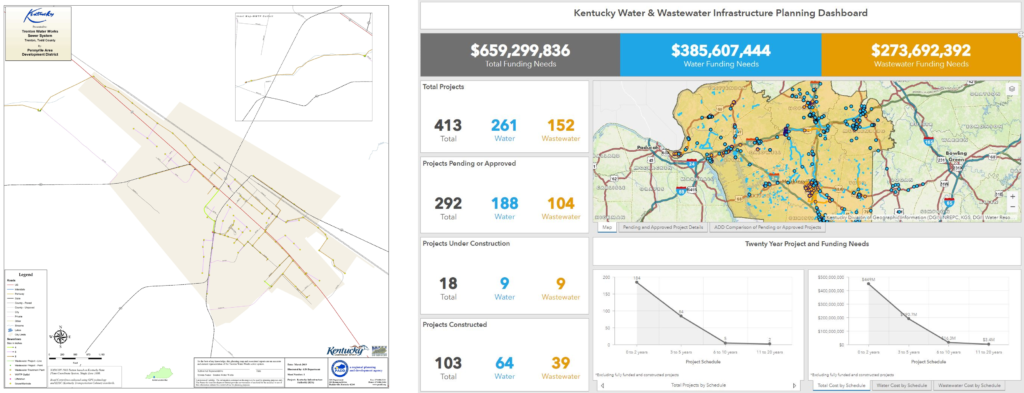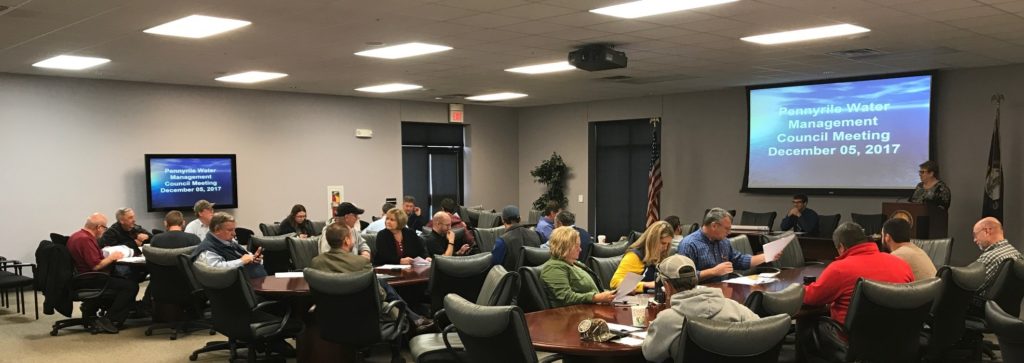The Challenge of Retaining Institutional Knowledge at Small Water Systems
An important but often overlooked management problem for small organizations is retaining institutional knowledge through the years. This concept refers to the collection of unwritten or decentralized information accumulated over time about an organization’s processes, assets, history, and relationships. While this kind of loss is common to organizations of all sizes, smaller groups are particularly susceptible because fewer people are usually involved in their creation and operations. Moreover, as we have moved to Internet-first workplaces, old paper documents and informal processes are often lost or forgotten when the staff members who created them move on or retire.
Small water systems in Western Kentucky faced losing institutional knowledge in recent years as the managers and directors who designed them began to retire. Small water systems, which comprise 97% of all U.S. water systems, each serve fewer than 10,000 customers. New managers at these systems were finding that their predecessors relied on dated processes for tracking system performance, including paper maps of assets that were disjointed, out of date, or even incomplete. Mergers between systems, done in the name of increasing efficiency, compounded the problems when they were carried out without careful efforts at combining data. Without stronger record-keeping, these systems faced the prospect of being unable to identify aging equipment before issues arose. It also made it difficult to prioritize maintenance projects and apply for outside funding. Moreover, the old-fashioned paper mapping system made tasks slow and inefficient that could be completed much easier using today’s technology.
Because small water systems often have minimal staff and bring in little surplus revenue, switching to modern GIS mapping of system inventories was an expensive and daunting prospect. For utilities like these, the resources required for transitioning to new processes often make them more expensive than old, inefficient ways of operating.
(Left): An image of a small sewer utility in Trenton, KY (pop. 400) mapped by PADD (Right): Dashboard image showing a map with proposed project points and the funding needing for projects in the PADD area (Photo credit: PADD)
PADD: Providing Staff Support and Mapping Expertise
Enter the Pennyrile Area Development District (PADD), a regional development organization based in Hopkinsville that serves nine counties and 32 cities. Through a contract with the Kentucky Infrastructure Authority, PADD was able to provide staff support and GIS mapping expertise to each of the region’s small water systems over a four-year period. GIS specialists reviewed paper maps, interviewed staff, and conducted site visits to catalog and geolocate thousands of discrete elements owned by the districts. These elements, which include water hydrants, valves, and sewer manholes, were then added to a statewide database. Centralizing this data helps stakeholders maintain compatibility between systems, enables new tools for technicians, and creates standardized data that can be evaluated across systems to measure performance and prioritize funding. Moreover, it minimizes the institutional knowledge loss that was challenging these small water systems.
As a public planning and development organization, PADD seeks to bring together stakeholders to accomplish broad goals across a portfolio of services that includes aging, community and economic development, human services, and workforce development. Its GIS mapping program is part of a larger effort to support the region’s small water systems to ensure the future well-being and continued growth of the communities in the region.
A meeting of the Pennyrile Water Management Council, tasked with evaluating and prioritizing needs at a regional scale (Photo credit: PADD)
Grant Management Assistance, Data, and Regional Coordination
Though not all RDOs have specific programs with small water systems, those that do can bring a range of expertise to bear on problems beyond GIS mapping. PADD also serves the region’s small water systems by maintaining a dashboard of system performance metrics and makes annual site visits to ensure data quality. It has helped disseminate information about water issues specific to the region, including challenges related to maintenance of aging clay water pipes. Most importantly, it has responded to a state and federal push for regionalization by developing expertise in grant and loan application management for small water systems.
PADD’s approach to funding applications has two main facets: direct technical assistance and the development of a process for regional coordination to prioritize highest-need projects. Staff maintain expertise on the changing grant and loan opportunities available from state and federal agencies. Moreover, they disseminate best practices for grant writing and administrative practices and use data and site visits to help systems determine what improvements should be prioritized.
In order to increase the competitiveness of small water systems funding applications, PADD has also created the Pennyrile Water Management Council, a board tasked with evaluating and prioritizing needs at a regional scale. The Council, made up of mayors, judges, system managers, and health department officials, meets quarterly to vote on project priorities. Their certifications increase the competitiveness of applications and ensure that money is spent responsibly on the small water systems. Through this regional approach, PADD works to promote efficiency, keep costs down for consumers, improve water quality, and break down barriers between municipalities in the pursuit of funding opportunities.
To learn more about regional development organizations (RDOs) like the Pennyrile Area Development District and how they can support your own local planning and infrastructure efforts, visit www.nado.org. If your community is not yet connected with your RDO or you are unsure which RDO serves where you live, please reach out to NADO Research Foundation Associate Director Brett Schwartz at [email protected].

This case study was written by NADO Research Foundation Graduate Fellow Dion Thompson-Davoli. Special thanks to PADD Infrastructure Coordinator Kyle Cunningham for sharing his time and expertise.

The NADO Research Foundation is a partner organization in the Smart Management for Small Water Systems project, a collaborative effort between the members of the Environmental Finance Center Network, the NADO Research Foundation, and the Government Finance Officers Association.
The Smart Management for Small Water Systems Project seeks to address major issues facing the nation’s smallest drinking water systems (those serving 10,000 or fewer people). Our team of experts works with water systems across the country, US territories, and the Navajo Nation to address these issues, which range from asset management and rate setting to water loss detection and conservation, through training and technical assistance. This project is made possible through a cooperative agreement with the U.S. Environmental Protection Agency. The information presented above does not necessarily reflect the views or opinions of US EPA.



